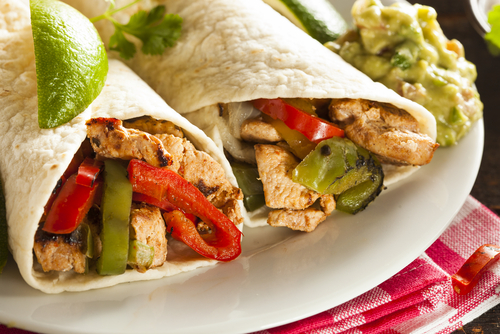Short answer
Fajitas can be bad for you - but if you make them at home and don't add too many fattening ingredients, they can also be healthy in several ways. Due to carcinogenic chemicals that arise from grilling meats, however, fajitas should not be eaten on a regular basis.
Recommended Alternative
Long answer
Fajitas can be hard to define, but generally speaking, the term "fajita" refers to grilled meat stuffed inside a tortilla (usually flour). Other ingredients may be added as well, such as lettuce, tomatoes, cheese, sour cream, guacamole, and vegetables. Due to the wide variance in possible ways to make a fajita, giving an exact answer as to whether or not a fajita is nutritionally bad for you is impossible. However, there are some things that we should consider before we order a fajita - both in terms of nutrition and otherwise.
First, in terms of nutrition, fajitas tend to be medium-range in calories, with around 300, give or take. Fajitas made with beef tend to contain a little more than 300 calories, whereas those made with chicken may have slightly less. However, there is a trade-off in that beef also contains more protein than chicken. Adding ingredients such as sour cream and guacamole can also significantly increase the amount of calories and fat in your fajita - yet, in the case of guacamole, avocado comes with various health benefits such as improving the immune system and helping to lower cholesterol, as well as several antioxidants that protect against diseases such as heart disease and cancer.
Another thing to consider is if your fajitas are restaurant-bought. Again, the healthiness will vary from establishment to establishment, with some places having modest amounts of fat and calories - and others having over 1,000 calories in one fajita and, in at least one restaurant, over 6,000 mg of sodium. Nearly triple the daily limit, this much sodium carries a serious risk of causing hypertension, cardiac arrest, stroke, liver damage, kidney failure, etc - especially when made a regular part of your diet.
Apart from nutrition, there is also concern regarding the fact that the meat in a fajita is normally grilled. The process of grilling meats releases chemicals known as polycyclic aromatic hydrocarbons (PAH) and heterocyclic amines (HCA). Both of these chemicals are known carcinogens, however, the extent to which they contribute to cancer in humans over a lengthy period of time is unknown.
In general, if you have fajita, it is best to have vegetables with a modest amount of meat (if any). Eating a fajita every now and again shouldn't be a problem, but be always be aware of how much sodium you may be consuming.
Possible long-term side effects
- weight gain
- heart disease
- hypertension
- kidney failure
- stroke
- liver failure
- heart attack
Ingredients to be aware of
- fat
- sodium
- pah
- hca

Benefits
- can be a good source of:
- vitamins
- minerals
- protein
Healthier alternatives
- vegetable fajita
- salad
Our Wellness Pick (what is this?)
Siete Almond Flour Tortillas
- Grain-free
- Gluten-free
- Almond flour based
- Dairy-free option
- Non-GMO
 Approved by
Approved by 















